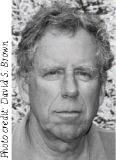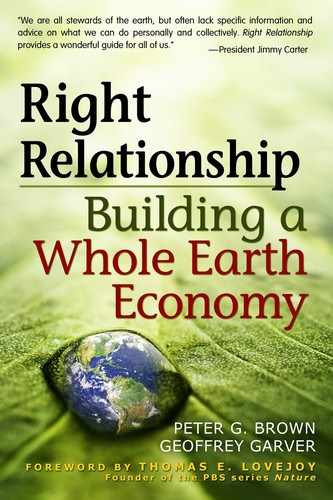About the Authors

PETER G. BROWN is a professor in the School of Environment, the Department of Geography, and the Department of Natural Resource Sciences at McGill University. Before going to McGill, he was Professor of Public Policy at the University of Maryland’s graduate School of Public Affairs; while at Maryland he founded the Institute for Philosophy and Public Policy, and the School of Public Policy itself, and also established the School’s Environmental Policy Programs. He is a graduate of Haverford College, and holds a master’s degree in the philosophy of religion from Union Theological Seminary and Columbia University, and a Ph.D. from Columbia in philosophy. He is the author of Restoring the Public Trust: A Fresh Vision for Progressive Government in America (Beacon Press, 1994), and Ethics, Economics and International Relations: Transparent Sovereignty in the Commonwealth of Life, second edition (Edinburgh University Press, 2008); it is published in North America as The Commonwealth of Life: Economics For a Flourishing Earth, second edition (Black Rose Books, 2008). He has edited and contributed to a number of other books and publications.
Brown is involved in conservation efforts in the James Bay and Southern regions of Quebec, as well as in Maryland. He operates tree farms in both locales and is a Certified Quebec Forest Producer, and in 1995 was Tree Farmer of the Year in Garrett County, Maryland. He is a member of the Religious Society of Friends.

GEOFFREY GARVER is an environmental consultant and lecturer in law in Montreal. From 2000 to 2007, he was a senior official at the North American Commission for Environmental Cooperation (www.cec.org), directing the unit that publishes detailed factual investigations of complaints by North American citizens that one of the NAFTA countries—Mexico, the United States, and Canada—is failing to effectively enforce its environmental law. At the CEC, he wrote reports on enforcement of laws on water pollution from Canadian pulp and paper mills, harm to fish habitat from logging in British Columbia, and the killing of migratory birds by timber harvesting in the United States. Previously, he spent nine years with the U.S. Justice Department’s Environment and Natural Resources Division, first as a trial attorney and then as an acting assistant chief handling cases dealing with land and natural resource management, water rights, and environmental impact assessment. Some of his major cases concerned the Everglades’ water quality, winter use and bison management in Yellowstone National Park, and water rights in Idaho and Oregon.
From 1993 to 1995, Garver was senior policy counsel in the Office of Enforcement and Compliance Assurance at the U.S. Environmental Protection Agency. Before joining the U.S. Justice Department in 1989, he was a judicial clerk for Judge Conrad Cyr in the federal district court in Bangor, Maine. He received a bachelor of science degree in chemical engineering from Cornell University in 1982 and a juris doctor degree, cum laude, from the University of Michigan Law School in 1987. At Michigan, he was an editor of the Michigan Law Review.
Garver grew up in a Quaker family in rural western New York.
KEITH HELMUTH has been primarily an entrepreneur, business manager, and community development activist. He is a founding board member of the Quaker Institute for the Future. Now living in Woodstock, New Brunswick, he spent the last ten years as manager of Penn Book Center, in Philadelphia. During the prior three decades he and his wife, Ellen, operated North Hill Farm in western New Brunswick. During that time they helped found the Woodstock Farm Market Cooperative and the Speerville Mill Cooperative. Keith Helmuth served on the Carleton Pioneer Credit Union board of directors for twenty-five years. During the 1970s he worked with the Public Participation Programmes of the Saint John Valley Regional Planning Commission and the Man and Resources Commission, Atlantic Region. From 1967 to 1970 he was on the faculty of Friends World College where he taught social ecology and environmental studies, served as director of library development, and was the founding chairperson of the Independent Studies Program. He spent a year at the college’s East African Center as director of economic development and environmental studies.
Helmuth is a graduate of the State University of Iowa (in intellectual history, humanities, and East Asia studies). He is the author of two Canadian Quaker Pamphlets: If John Woolman Were Among Us: Reflections on Flush Toilets and Motor Vehicles and From Arrowhead to Hand Axe: In Search of Ecological Guidance, as well as a volume of poems for children, Beauty Is the Earth’s Bright Call.
ROBERT HOWELL has many years of experience as a manager, consultant, and university teacher with competencies in strategic visioning, strategic planning, governance and policy setting, organizational and systems design, and implementation, as well as business ethics. He teaches business ethics at the School of Integrated Business, AUT University in Auckland, New Zealand, and is the CEO of the Council for Socially Responsible Investment New Zealand. He has worked in advisory, teaching, and CEO positions in the health, local authority, international education, and nonprofit sectors.
Howell has played a significant role in the introduction of social and environmental factors into New Zealand investment. He has assisted in introducing nonviolent conflict resolution training to the Indonesian police force. He has led and worked with Aotearoa New Zealand Friends to identify a strategic appreciation of climate change and its long-term social and economic consequences.
STEVE SZEGHI is a professor of economics at Wilmington College where he has taught for twenty years, been active in faculty governance, and served for many years as department head and area coordinator. He received his Ph.D in economics from the University of Cincinnati. Today his research focuses on themes of social justice, fair distribution, environmentalism, and concerns for indigenous cultural survival. In addition to being an academic, Szeghi has been active throughout his life in fighting for social justice and ecological balance. Beginning at the age of 15 through his mid-20s he worked with Cesar Chavez and the United Farm Workers. He continues to work with several labor unions, as well as American Indian tribal governments, cultural survival groups, and environmental organizations. He is currently developing several student study and research trip courses to the American Southwest where students study and research the interrelationships between wilderness, American Indian communities, and the cultural and environmental impacts of human activities in the Southwest.
